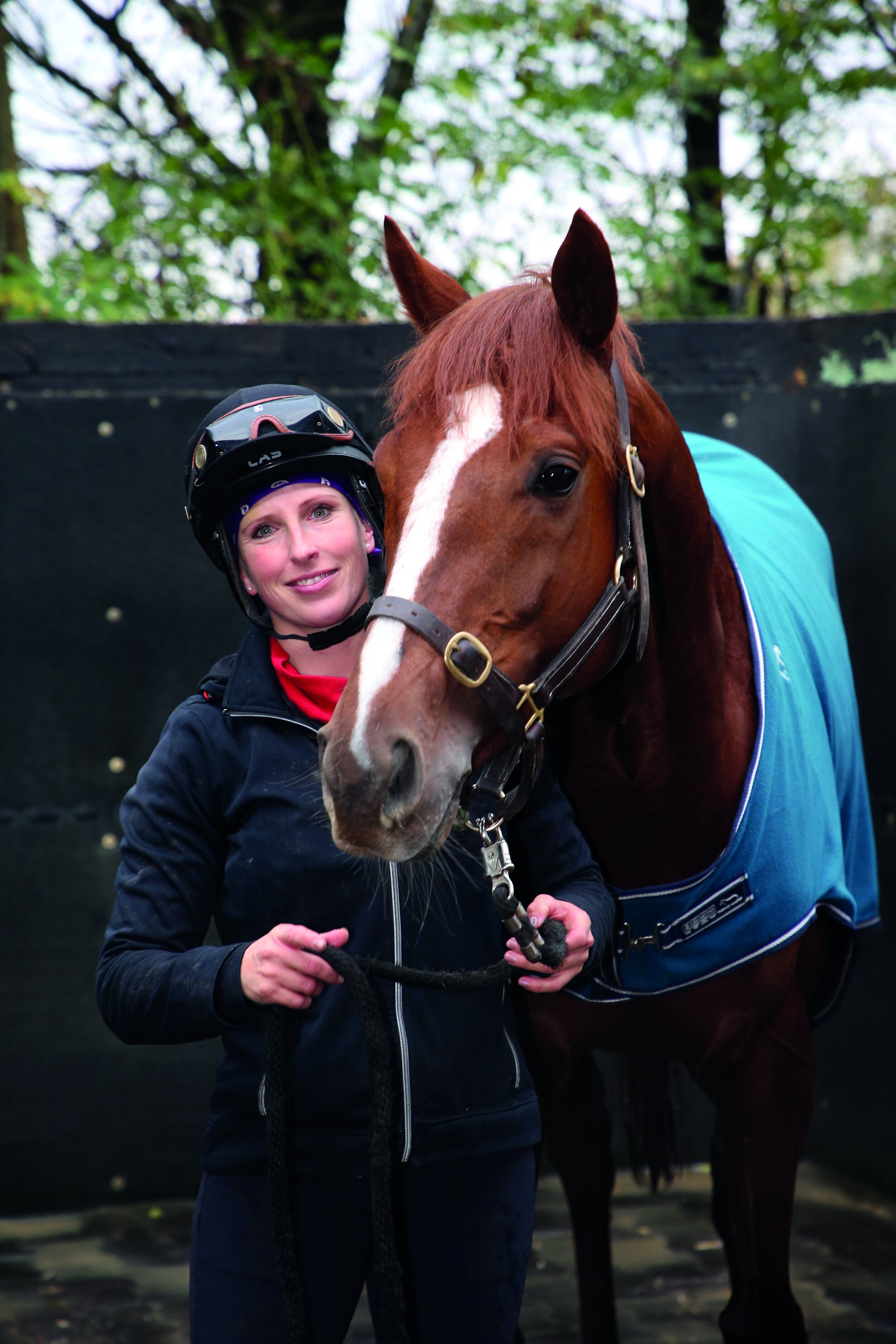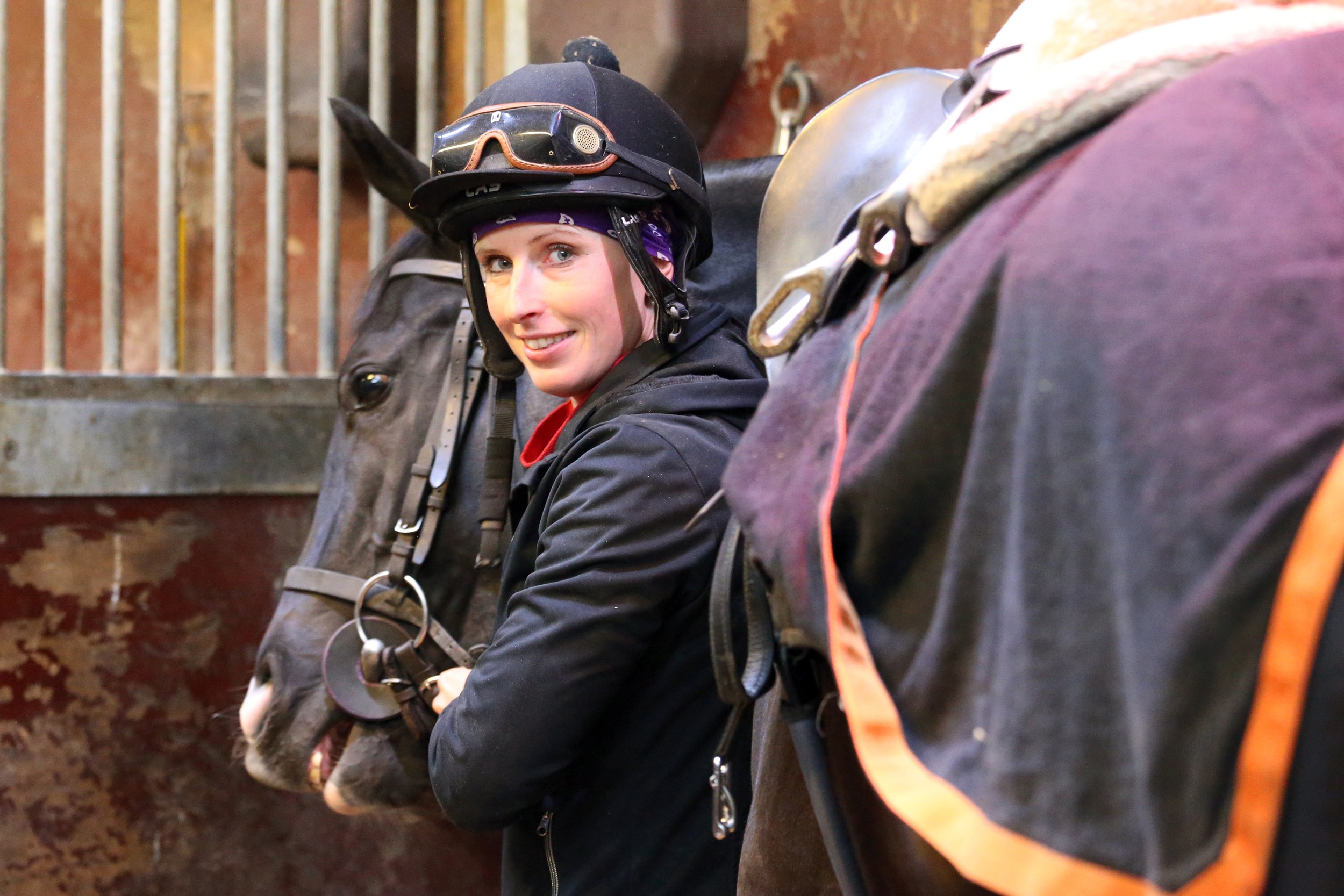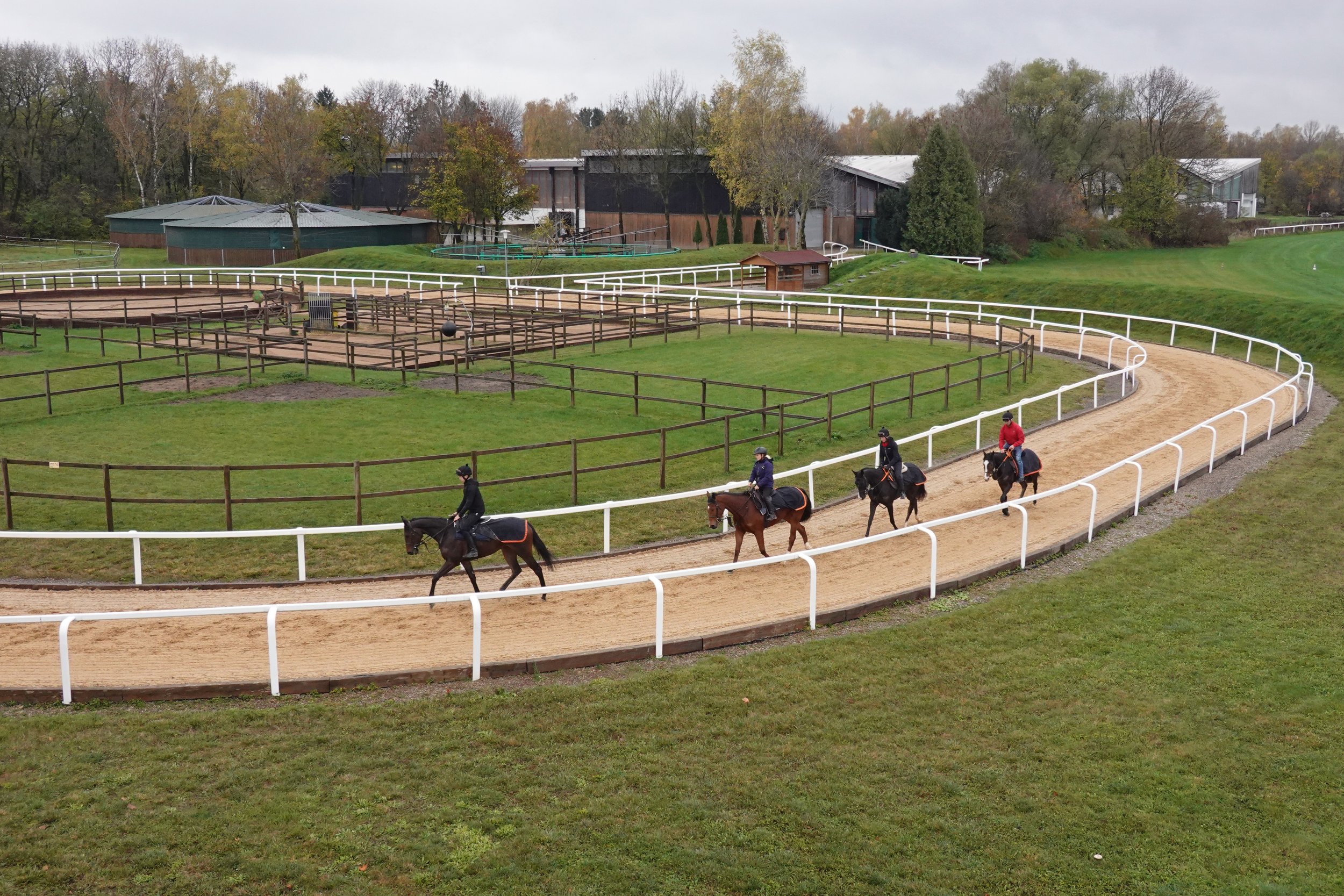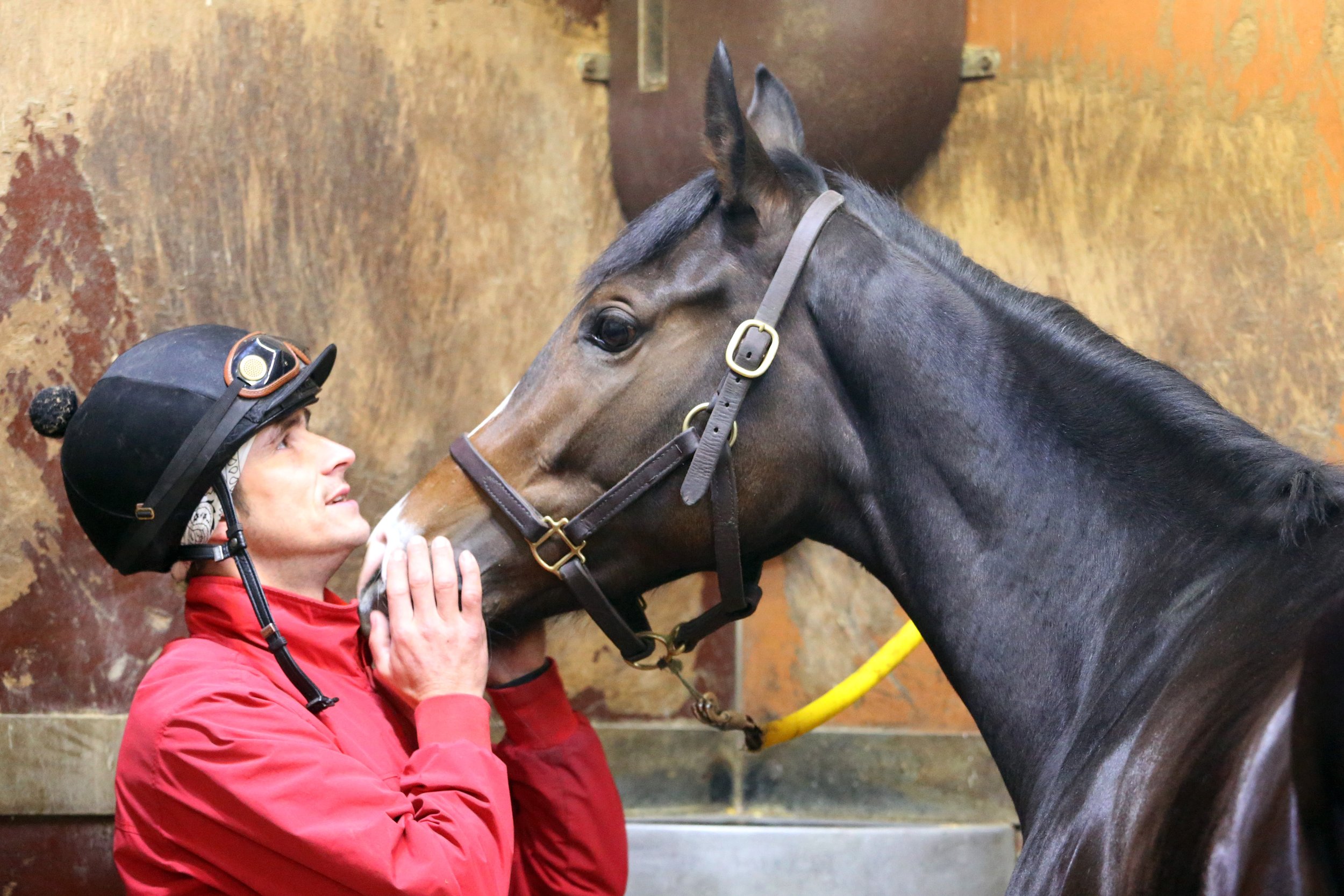Sarah Steinberg - One of Germany’s up-and-coming trainers
Article by Catrin Nack
Compared with leading European racing nations, Germany's figures are very small indeed. Roughly 2200 horses, trained by 70 licensed trainers are trained here. With a big chunk trained by a chosen few – think Marcus Klug, Henk Grewe, Andreas Wöhler or Peter Schiergen – the numbers for smaller stables become smaller still.
Few trainers train more than 100 horses at the best of times; the ‘powerhouse’ yards with 150+ or even 200+ horses – which are so common nowadays in England, Ireland and France – are simply non-existent in a racing country constantly boxing above its weight.
As does Sarah Steinberg, no pun intended.
Sarah Steinberg´s official training list comprises 26 horses, three of which are her own. This is small even by local standards. Sarah Steinberg makes no excuses: “I do not want to train more than 35 anyway.” Small, but brimming with quality, it is quality horses that she strives to train. “My owners do not want runners in low (rated) handicaps, and for them I do not want that either. We think big and aim big”
Steinberg is a salaried trainer, employed by the RTC Rennpferde Trainings-Center GmbH. The name behind the entity is that of Hans-Gerd Wernicke, a 93-year-old manufacturer of quality sleeping systems.
His company Wenatex was founded in Salzburg, and it is under that name that his horses race. Stall Salzburg has 13 horses in training – thus comprising 50% of Steinberg’s inmates.
A further five are owned by Brümmerhof Stud, a major owner-breeder and supporter of German racing. Famous as the breeder of Danedream – and infamous for selling her early in her 2yo season - Brümmerhofs Gregor Baum just closed his own private training facility in Hannover. His link to Sarah Steinberg could well point to her future. But let's look back into her already remarkable journey in racing before we dare to look into the future.
Sarah Steinberg is 34 years old, with no family ties in racing whatsoever. Her aunt kept Arabian horses, and early memories consist of watching the Germany Derby on TV; but she can’t recall her first Derby winner, “I wasn’t really interested, and I certainly did not catch fire early on.” Animals – horses and dogs – were part of her upbringing; and while circumstances were traumatic, the following story is early proof of the unusual dedication and commitment to the creature. “My father had a very serious accident. He was hospitalised for months and had to spend long weeks in rehabilitation after. This meant I had to look after the 30 Huskies (we owned) for more than a year, otherwise they would have been given away.” Steinberg was just eight years old.
She was given a holiday on a pony farm for a job well done after, and it was then that her fascination for horses took root.
Her education with horses was classic and western style. Racing came into her life by default rather than design. Yet again, it certainly wasn’t love at first sight.
With her parents pressing for a solid education, her growing passion for horses got in the way. A small local permit holder with eight horses – Steinberg had answered an advert in a local (non-racing) paper – could not provide the structure they desired.
But Germany's formal education system – even in racing – led to a visit to Cologne, still the administrative centre of German Racing. Here she was taken on by Andreas Trybuhl, son of a racing family and the first proper trainer who spotted her talent. Steinberg was on her way.
Well, sort of. It wasn´t that Deutscher Galopp had waited for a young female rider, with fancy ideas at that. Steinberg rode in a couple of races. Nineteen rides and two wins are hardly the stuff of legends. She then plied her trade as a work-rider — in big yards.
Leaving Trybuhl, she worked for Peter Schiergen, had a short stint with Marcus Klug and was riding out for Jens Hirschberger when he trained Adlerflug. But Steiberg was still ‘just’ a work-rider nonetheless.
When the opportunity came, Steinberg grabbed it with both hands. Enter Hans-Gerd Wernicke. By the time their paths crossed, Wernicke had been an owner for nine years, with group performer Poseidon Adventure and the wonderful Gp1 winner Night Magic – both trained in Munich by Wolfgang Figge.
Figge retired at the end of the 2015 season, and Wernicke was on the lookout for a new trainer. Again, it was an advert that changed the course of Steinberg’s life.
“I thought I really had nothing to lose. But I had nothing to recommend me either – no references, no proper job description to boost. After all, I was only a work-rider.” Wernicke liked what he read – liked even better what he heard when Steinberg detailed her ideas about training and didn’t ponder for long. It didn’t take Steinberg long to prove just how good of a choice she had been, either.
It wasn’t that Wernicke approached his new, young trainer with starry eyes. He was prepared to give her a chance, but at first it was with horses for whom she was second choice – horses from other yards, who for whatever reason didn’t, or couldn’t, fulfil their potential.
Night Wish, in March 2016, was her first winner as a fully fledged trainer; he was only the second starter she sent out. Better was to come when Night Wish again read the script and became her first pattern scorer when taking the Grand Prix de Vichy (Gp3) later that year.
In seven full seasons Steinberg has now, at home and abroad, trained 124 winners, 14 of them Group winners. This year she operated at a nearly 30% winner-to-starter ratio in her native Germany. She has trained a Classic winner in Fearless King (German 2000 Guineas, Gp2) – the first female trainer to do so in Germany – and Mendocino, was her first Gp1 winner, when scoring in German´s most prestigious open-age Gp1, the Großer Preis von Baden this past September.
Trainers simply do not come more hands-on than Sarah Steinberg. She rides six lots a day, she grooms, and she drives the horsebox. She even, unique among her peers, leads up nearly all her charges.
Finding good staff is a challenge even she cannot resolve, but Steinberg is the first to admit she isn’t easy to work for either. “I expect a lot and cannot tolerate mediocrity. I had to learn that I simply cannot expect employees to work as hard as I do.”
Invaluable assistance comes in the shape of René Piechulek, of Torquator Tasso-fame. The jockey's rise to fame is worth its own chapter, but he started riding out for Steinberg at the end of 2017, becoming attached to Stall Salzburg in the process.
With no chances of foreign jockeys, COVID accelerated his rise to salaried stable jockey. And he did become attached, quite literally, to Sarah Steinberg as well; they are life partners now.
“René is invaluable – simply irreplaceable to the yard; I simply could not do it without him. I am the trainer after all, he does as I tell him, but I would be lost without his feedback.” For Steinberg, training horses is a mission. With her background in classic riding, it is small wonder that above-average riding skills are essential for her staff.
“Horses need to use their backs, and they can only do this if they bend their necks properly. So much damage is done when horses do not use themselves right.”
On average, her horses are ridden about an hour a day, with an additional four hours spent in one of the six (four grass) paddocks. Daily, that is.
With few exceptions, racehorses in Germany are trained directly on the racecourse – Munich in Steinberg´s case – a base she cannot praise highly enough.
Crucially, Munich´s training centre is right next to the track itself with long and well-maintained grass and sand gallops, and with only a handful of trainers sharing those facilities.
Wernicke's generous approach and competitive nature developed just what Steinberg wanted in their own stables. “I really have everything I need; it’s top class. I have my private trotting ring; there is a covered hall. I have a salt box, which I use to great effect, and two solariums. The open country next to the training tracks is another plus; we have choices and can give the horses a change of scenery.”
She works closely with her trusted vets and a chiropractor, not to mention a top-class farrier. Conveniently, the RTC GmbH comes with a racing secretary too, so the time Steinberg has to spend in the office is very limited indeed.
“Really, I would never want to work self-employed. My system simply would not work with all those pressures attached.” Individuality is the key. “Of course, the basic work is the same for all horses, but the individuality starts creeping in once horses start showing their quirks. We love to get to the bottom of problems and want to bring the best out of every horse in our care.”
Remarkably, three of her 26 inmates have a German GAG (rating) of 90 or higher – roughly 106 plus in International ratings. Nowadays, Steinberg is responsible for selecting youngsters at the sales. Wernicke is a racing man and not a breeder.
The stable's flagbearer for the last couple of years has been the above-mentioned Mendocino, bred by Brümmerhof Stud and a son of the late Adlerflug.
Selected by Steinberg, he represents all she looks for in a horse. “I look at horses, not pedigrees. In fact, I couldn’t care less about the breeding. I need to see the horse's personality. I try to read their eyes, and how they play with their ears tell me something too. They need to be alert – lively. I don’t like the docile ones. A shorter back and strong back hands are essential to me, but I can forgive small mistakes if I feel the attitude is right. After all, it's all down to their character and their will to win.”
Offspring of the much missed sire Adlerflug, present their own challenges, but in Mendocino, Steinberg has found a horse of a lifetime.
The now 5yo has won three races from 11 starts and has provided Steinberg with that all-important win at the highest level, and he did take his team to Paris Longchamp on the first Sunday in October.
“I am accredited as his ‘lass’ and ride him myself every morning.” She rejects the notion that surely she will not lead him up when competing in a big race.
“Of course I will,” she muses. Steinberg has lost count of the winner´s ceremonies she missed because of her role as a ‘lass’ – something Wernicke had learned to accept. “He was a bit miffed when I kept skipping the ceremonies because I wanted to be with the horse after the race, so I pointed out that it's better to have those winners and no trainer, or not so fast horses. He can see the humorous side now.”
The whip-debate and animal welfare put extra pressure on German racing. Steinberg has a clear view on both: “The whip is essential – a life-saver for riders. With the short stirrups, we need it to correct but never to abuse. We need strict rules and even stricter penalties. As for animal welfare, I am in the game because I like horses – we all do. We like them, and we want the best. Performance is no cruelty to horses, and I firmly believe the majority of racehorses couldn’t be better cared for. There are black sheep in all walks of life, and much more must be done to educate about the good work that is done away from the public eye.”
Steinberg is realistic enough to wonder what the future holds, even though Wernicke shows no signs of stopping. The recent trip to Hong Kong (with Mendocino) came at Wernicke’s insistence and was Germany's sole representative.
There is no happy ending to report, as Mendocino proved worth his billing as a “character.” After behaving beautifully in the preliminaries, he reared in the starting stalls and refused to jump with the field – the first time he has shown such antics. But Steinberg wouldn’t be Steinberg if she wouldn’t rise to this challenge too.







